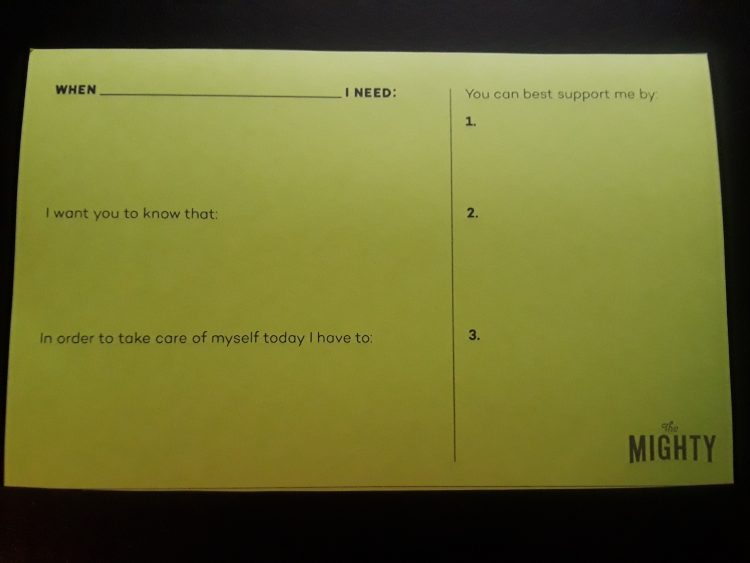“Can I do anything to help? How can I best support you? How do you need to take care of yourself today?”
How would you feel if someone asked you these questions? Relieved? Surprised? Uncertain? In honor of Mental Health Month, The Mighty asked people to recognize their own needs, and put them into words for family and friends. These answers took the form of “I Need” cards, like the one pictured below.

In order to start much-needed conversations about mental health, and learn more about the subject, I printed dozens of these cards for my loved ones to fill out. With their permission, their anonymous answers are included at the bottom of this article. In reading their answers, I learned the following things:
First, I learned what I personally can do to support my loved ones. Many of my friends and relatives deal with mental and chronic illness. Often, I want to help, but I don’t know what to say. These cards gave me insight on what my loved ones need to hear. Going into this project, I initially focused on what doesn’t help. For example, telling me to “stop worrying” does not help my anxiety, and I get frustrated when people say it. My participants did state several actions and phrases that were not helpful, but then they went on to state what you could do to help instead. Their answers put a more positive spin on my thinking, and gave me proactive ways to help, instead of merely listing things not to do or say.
Next, I learned many people will open up if you ask them how you can support them. Sometimes, I want to help a friend who’s depressed or otherwise struggling, but I’m afraid if I bring up the subject, I will make them feel worse. Through this project, I learned if you bring it up in a way that sounds caring (rather than condescending or nosy), most people appreciate knowing you care. When asked, many people will share what they need on hard days. Then you will feel better equipped to help them instead of feeling awkward. Some people are more comfortable discussing their mental health than others. If they are willing to discuss it, you can ask further questions in order to understand them better.
For example, one participant went into more detail and explained how being in a crowd makes him feel, and why he cannot be alone when he is depressed. Some people will be glad for the opportunity to help others understand mental health, and most will be glad to know you care.
The next thing I learned is that people need different kinds of support. When facing similar situations, some people need to be left alone, while others need company. Some need to talk about their feelings, while others need to be kept busy and distracted. If you want to help, you must learn to support them in whatever way helps them, not the way that helps you. On the flip side, if you want other people to help you, you must open up and let them know how best to do that. For example, when I talked with my mom about personal problems, she tried to help by giving advice, but what makes me feel more supported is just listening and expressing confidence in me. Once I was able to recognize and express this need, we started communicating better. The key is to ask others how to support them, and tell others how to support you.
Finally, I learned that in spite of all our different struggles, feelings and experiences, we all need unconditional acceptance and understanding. Every participant expressed this idea to me in some form, and I expressed it to my own support system as well. We all need to feel accepted, validated and worthy. My mom always told me, “You don’t have to understand to be understanding.” Even if you have never experienced that type of situation, you can show that you care. Even if you have experienced something similar, you are not exactly the same, so be a good listener and avoid comparing. Start conversations. Ask questions. Listen with your heart. Try to see things from your loved ones’ perspective. Behave in a way that shows their feelings matter to you. Pay attention when they reach out, then implement the means of support they ask for. Connect them with professionals and resources. If we put these steps into practice, we will be well on our way to building more supportive friendships, families and communities. I hope reading this article and the answers below will give you ideas for how to start conversations and show support in your own circles.
WHEN I AM HAVING A PANIC ATTACK…
I need: Space and unconditional support.
I want you to know that: Sometimes I can’t handle being touched, and other times it helps. Please listen to my instructions on this.
In order to take care of myself today I have to: Get some rest. Panic attacks exhaust my body.
You can best support me by: 1) Not giving trite suggestions of what I should be doing (should is a bad word when I’m anxious). 2) Reminding me that I am safe and that this will pass. Reminding me of encouraging Scriptures and songs. 3) Coaching me through deep breathing and visualization.
WHEN I AM FEELING OVERWHELMED…
I need: Reassurance and distraction.
I want you to know that: I try to do a lot to help myself and others. I probably take on more than I should, but I like to feel useful and help.
In order to take care of myself today I have to: I will need to be human and take care of myself and what I need. Watch a movie and try not to think of needs (of others) for a while.
You can best support me by: 1) Letting me know that it’s OK to be human. 2) Reminding me that things will be all right no matter what comes along. 3) Take a walk with me, laugh with me, distract me so some weight comes off my shoulders for a while.
WHEN I AM FEELING VERY SAD…
I need: Love, understanding, smiles and at times… my own space, just for a while.
I want you to know that: At times I get so sad by the world, it feels like my heart is breaking in a million pieces. At times it happens even though things are going great.
In order to take care of myself today I have to: Cry it out. Sometimes be alone, sometimes talk, sometimes listen. Sometimes just sit on my porch and think of beautiful people and things. Pray a lot!
You can best support me by: 1) Please don’t give up on me, even if I tell you I think you should. 2) Please don’t be mean or make fun of me. Don’t make me feel weak or worthless or humiliate me. I feel like this already. 3) Remind me that God and Jesus love me, that I am worthy of love and deserve kindness and understanding, and that it’s OK to cry sometimes.
WHEN I AM HAVING AN MULTIPLE SCLEROSIS FLARE-UP…
I need: Understanding and patience. Sometimes a little help. Prednisone medication helps best.
I want you to know that: My illness is not your fault. I try my best to handle all that comes my way, although at times new things spring up for me too and are scary.
In order to take care of myself today I have to: Take things slower and rest more. Fresh fruit and veggies help. Please don’t expect the impossible from me today. Today, I am not Wonder Woman.
You can best support me by: 1) Understanding my illness. Know it’s not my fault, so please don’t blame me. 2) Tons of stuff is going on inside my body, but it looks just fine outside. 3) On any given day I can wake up and something may not work that day. Eyes, ears, legs, arms, feet, organs. It is frustrating and scary.
WHEN I AM DEPRESSED…
I need: To keep my mind busy. Otherwise, when it sits idle, it spins through all the pain and wrong that has been done.
I want you to know that: I care more than most, so please don’t put me down.
In order to take care of myself today I have to: Hold onto the ones I love. Stay out of the crowds, because in crowds, anxiety kicks in and I feel trapped. But at the same time, I can’t be left alone, because it gives a feeling of pending doom that does not let up. Keep my mind busy.
You can best support me by: 1) Simply being a good person that inspires me to do better. 2) Do not talk to me about the depressed thoughts that go through my head. 3) Live for today and only today. Just have fun in the moments we have.
WHEN I AM EXTREMELY STRESSED OR ANGRY…
I need: To vent.
I want you to know that: Walking to calm down just doesn’t do it for me. When I feel like this, I need to punch a punching bag or do some writing.
In order to take care of myself today I have to: Have plenty of space and emotional support.
You can best support me by: 1) Listening with an open mind. 2) Giving me some space for as long as I need it, and not insisting that I’ve already had space for a few hours. 3) Not bringing up past arguments or criticizing without a good reason.
WHEN I AM HAVING BAD ANXIETY…
I need: To read a book.
I want you to know that: When I experience bad anxiety and I stop talking, it’s my way of avoiding lashing out at people. I get really stressed when I have anxiety.
In order to take care of myself today I have to: Take my anxiety pills daily.
You can best support me by: 1) Listening to me when I complain. 2) Listening when I talk to you about something that is making me sad. 3) Always being there for me.
WHEN I AM DEPRESSED…
I need: Space.
I want you to know that: Just because I have a mental illness, it doesn’t mean that I am “crazy” or “unstable.”
In order to take care of myself today I have to: Distract myself.
You can best support me by: 1) Praying for me. 2) Listening when I talk.
WHEN I AM HAVING A PANIC ATTACK…
I need: Quiet, space and rest.
I want you to know that: It’s not your fault. I always feel better after I rest.
In order to take care of myself today I have to: Be alone and sleep.
You can best support me by: 1) Reassuring me that you know it is not my fault or my choice. 2) Reassuring me that you will still be there when I wake up. 3) Not treating me like I am “nuts.”
WHEN I AM DEPRESSED…
I need: Tasks to accomplish. A routine.
I want you to know that: This too shall pass. I really am fine.
In order to take care of myself today I have to: Take a shower, eat and read my Bible.
You can best support me by: 1) Sending me messages. 2) Not asking too many questions about the depression. 3) Distracting me with everyday things, like, “What are you making for dinner?”
We want to hear your story. Become a Mighty contributor here.
Getty image via jacoblund

